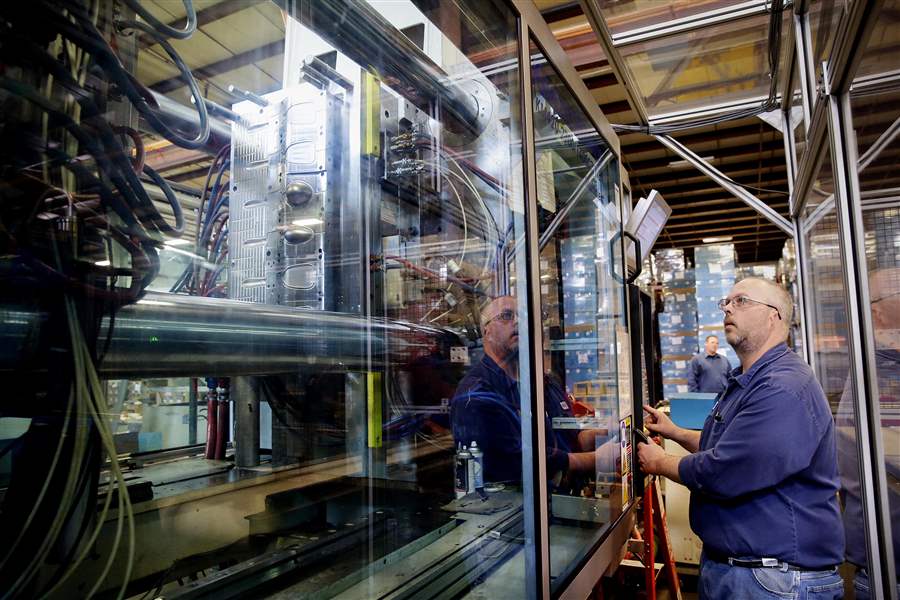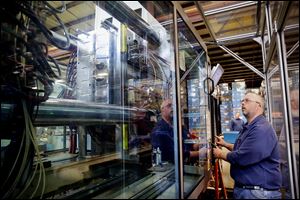
Wal-Mart makes progress on ‘Made-in-America’ vow
7/10/2016
Josh Rotzoll, lead processor at Tailor Made, checks the machines that produce the molded plastic items that are purchased by Wal-Mart, which used to buy the items from China.
MILWAUKEE JOURNAL SENTINEL
MILWAUKEE — You won’t hear anti-Wal-Mart talk from Wisconsin manufacturers Tailor Made Products and Rockline Industries.
Both are among companies enjoying increased business as a result of a public pledge by the world’s largest retailer to step up purchases of U.S.-made goods by $250 billion over 10 years.

Josh Rotzoll, lead processor at Tailor Made, checks the machines that produce the molded plastic items that are purchased by Wal-Mart, which used to buy the items from China.
Tailor Made added a production cell at its Elroy factory in 2014 after winning a contract to manufacture kitchen utensils — potato mashers, ladles, turners, and such — that Wal-Mart Stores Inc. formerly sourced from China.
Sheboygan-based Rockline expanded its factory in Springdale, Ark., within the last year, in part to produce facial wipes for the mega-retailer.
“Wal-Mart has made this commitment, and I don’t know if a lot of the general public believe it, but it is true, it is happening, and it is improving American life by offering high-quality jobs with competitive benefits,” said Jeff Wittkopp, senior vice president of product development at Tailor Made.
Others are less enthusiastic.
This is, after all, Wal-Mart, the $478 billion firm whose relentless drive to offer its customers rock-bottom prices is widely viewed as having helped push factory jobs from the United States to China and other low-wage countries in the first place.
“Reminds me of when you were a kid and someone took your candy and you got it back, and they wanted credit for giving it back to you,” said Scott Paul, president of the Alliance for American Manufacturing, a lobbying and research group founded by the United Steelworkers union and domestic manufacturers.
Cindi Marsiglio, the Wal-Mart executive spearheading the initiative to buy more American-produced goods, has heard the candy-theft critique before.
“My general sentiment,” Ms. Marsiglio said, “is that does not preclude me from continuing to enthusiastically bring American jobs back as a retailer. It’s kind of a so-what. So as a maker of nothing, as a manufacturer of nothing, if Wal-Mart can accelerate this resurgence and play a role in bringing any American jobs back, we’re going to do that.”
Wal-Mart announced its effort in 2013, as rising factory wages in China were helping make U.S production of some goods more attractive, and with manufacturing employment here rising for the first time since the late 1990s.
Since 2010, the rebound has added nearly 800,000 manufacturing jobs. But 5.7 million were lost from 2000 to 2010 — 1 out of every 3 manufacturing jobs the country had at the start of the decade.
Most of that huge loss — the greatest the country had seen in at least 70 years — came before the 2007-2009 recession set in and as imports from China soared.
China’s WTO entrance
With the Asian giant admitted to the World Trade Organization during most of the period, the value of its shipments to the United States have increased nearly sixfold since 1999.
Wal-Mart’s import volume from overseas has increased too, though not as steeply. Last year, the company brought in nearly 795,900 containers of ocean-borne goods, more than three times the level of 1999, according to annual estimates by the Journal of Commerce, part of IHS Inc.
Wal-Mart is easily America’s largest importer in terms of number of seaborne shipping containers. And its container imports have continued to rise. During the three years since the firm announced its domestic sourcing initiative, the number of seaborne containers it imports has increased by 10 percent, the Journal of Commerce estimates show.
Wal-Mart said that, according to data from its suppliers, items made, sourced, or grown domestically account for about two-thirds of the retailer’s spending on products for its U.S. operations.
Wal-Mart won’t specify where it stands on progress toward its $250 billion goal, other than to say the company is on target.
On its website, the company lists 40 suppliers it links to the initiative. Some have made major announcements.
Giti Tire is building a $560 million plant in South Carolina that will produce tires for Wal-Mart. Giti has said it expects the factory to create 1,700 jobs over 10 years.
Wal-Mart supplier Element Electronics Corp. has begun assembling television sets in a South Carolina factory that, according to the state commerce department, is expected to create 500 jobs.
Another supplier, Impact Innovations Inc., bought a shuttered factory in Memphis and started making gift wrap for Wal-Mart there last year. The plant now has 90 full-time employees and hires the equivalent of 125 additional workers for seasonal work March through November, CEO John Dammermann said. Before opening the Memphis factory, he said, Impact made all of its gift wrap for Wal-Mart in China.
Wisconsin figures prominently in Wal-Mart’s Made-in-America commitment. No state outside the South has more suppliers on the retailer’s list.
Besides Tailor Made and Rockline, Wal-Mart cites: NUK USA, which makes baby pacifiers and infant spoons in Reedsburg; Uniek Inc., which produces photo frames in Madison, and Hampton Products International, a California company with a facility in Shell Lake, in northwestern Wisconsin.
Given that Wal-Mart already devotes two-thirds of its purchases to U.S. goods, natural growth in the company’s sales could contribute significantly toward the $250 billion goal.
Still, even for a company as huge as Wal-Mart, $250 billion in added spending over 10 years is a big number. If achieved, it could create 1 million jobs, the Boston Consulting Group has said.
The business consulting firm has been a prominent voice predicting a return of manufacturing to the United States, saying that rising Chinese wages, higher American productivity, and other factors will close the cost gap for many goods destined for North America.
“It is about the pendulum swinging,” said Harold Sirkin, a senior partner at Boston Consulting.
When China entered the World Trade Organization in late 2001, “they had a massive advantage,” Mr. Sirkin said. “In a matter of 15 years, that advantage is becoming very small.”
But another management consulting firm, A.T. Kearney, said “reshoring” of manufacturing by U.S. companies continues to lag behind the shifting of production out of the country.
Add it all up, Harry Moser said, and the United States now is roughly breaking even — domestic manufacturers still are moving jobs to other countries, but the jobs gained from reshoring and foreign investment here roughly offset the losses.
That, said Mr. Moser, founder of the Reshoring Initiative, stands in sharp contrast to the early 2000s, when the United States was registering huge net losses of manufacturing jobs to foreign soil.
A former machine-tool executive, Mr. Moser started his nonprofit agency in 2010 to help bring back manufacturing, in part by providing free software firms can use to compare total production costs here and abroad. He’s a consultant to Wal-Mart.
His job, Mr. Moser said, “is to help them improve the odds” on what he called a monumental challenge. Mr. Moser estimates — and he stresses that the calculation is his, not Wal-Mart’s — that the company’s purchases will have to be spread across thousands of products to meet the $250 billion goal.
He praises Wal-Mart for its commitment. Through its efforts, he wrote in a blog post in December, the company already has spurred creation of at least twice as many U.S. manufacturing jobs as any other company the Reshoring Initiative tracks, and has the potential to do much more.